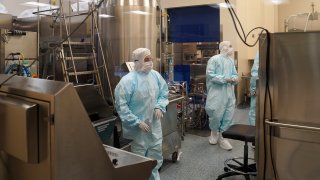
- Some employees at the Emergent BioSolutions plant in Baltimore failed to shower or change clothes, according to a memo released Wednesday by a key House committee.
- It is required when working in the factory and likely played a role in ruining millions of Johnson & Johnson's Covid-19 doses, the committee said.
- Inspections of the facility conducted last year also flagged problems with mold, poor disinfection of plant equipment and inadequate training of employees.
Some employees at the Emergent BioSolutions plant in Baltimore failed to shower or change clothes, which is required when working in the factory and it likely played a role in ruining millions of Johnson & Johnson's Covid-19 doses, according to a memo released Wednesday by a key House committee.
Inspections of the Bayview facility conducted last year also flagged problems with mold, poor disinfection of plant equipment and inadequate training of employees, staff for the Select Subcommittee on the Coronavirus Crisis said in the memo. The committee is holding a hearing Wednesday examining the biopharmaceutical company's role in ruining the J&J shots.
Get South Florida local news, weather forecasts and entertainment stories to your inbox. Sign up for NBC South Florida newsletters.
Even though inspectors found poor conditions at the plant, top executives were awarded hundreds of thousands of dollars in bonuses last year and were praised by the company's board for their leadership, according to other documents released by the committee.
Emergent CEO Robert Kramer received a $1.2 million bonus last year, according to one document, while three other executives received payments of more than $400,000.
Money Report
The U.S. government awarded the company a $628 million contract last year to help make coronavirus vaccines.
Emergent did not immediately respond to CNBC's request for comment.
The hearing Wednesday comes more than a month after the Biden administration put J&J in charge of the Baltimore plant after U.S. officials learned that Emergent, a federal contractor that had been making key ingredients for J&J and AstraZeneca, cross-contaminated ingredients for the two shots.
During the hearing, Kramer said the FDA is holding over 100 million J&J Covid-19 vaccine doses for further testing.
"There are a significant number of doses that we've manufactured. Again, we manufacture the bulk drug substances," Kramer told lawmakers. "It has been reported in a number of news agencies that there are probably over 100 million doses of the J&J vaccine that we've manufactured that are now being evaluated by the FDA for potential release and availability."
An inspection by the Food and Drug Administration later found the plant was unsanitary and unsuitable to manufacture the shots. In a 13-page report, inspectors wrote that the facility used to manufacture the vaccine was "not maintained in a clean and sanitary condition" and was "not of suitable size, design, and location to facilitate cleaning, maintenance, and proper operations."
FDA inspectors said paint was observed to be peeling in multiple areas and walls were damaged that could impact Emergent's "ability to adequately clean and disinfect." They also noted that employees did not follow standard operating procedures in handling waste or vaccine manufacturing materials to ensure they weren't contaminated.
The facility has not been authorized by the FDA to manufacture or distribute Johnson & Johnson's Covid-19 vaccine, and none of the doses manufactured at the plant have been distributed for use in the United States. Emergent has agreed to pause production of materials until the issues the FDA identified are resolved.
Emergent said at the time it was committed to working with the FDA and J&J to fix the problems.
"While we are never satisfied to see shortcomings in our manufacturing facilities or process, they are correctable and we will take swift action to remedy them," it said in a statement on April 21.






